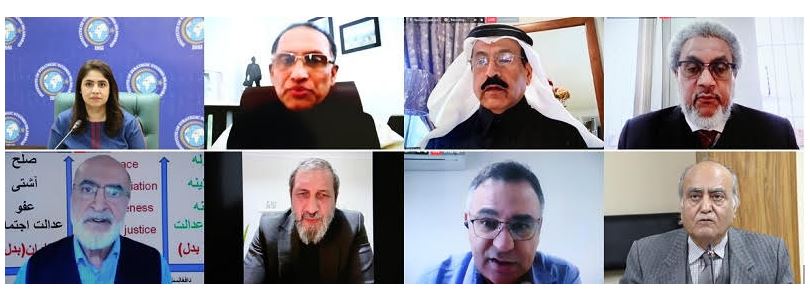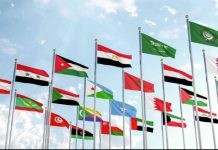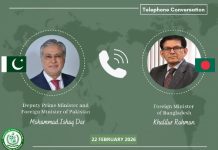The Centre for Afghanistan, Middle East & Africa (CAMEA) at the Institute of Strategic Studies (ISSI) in collaboration with the Middle East Monitor (MEMO), UK held a webinar on “Conversations on Afghanistan: Middle East’s Perspectives” on November 10, 2021. The distinguis hed speakers included: Ambassador Ali Awadh Asseri, Former Ambassador of Saudi Arabia to Pakistan, Dr. Daud Abdullah, Director Middle East Monitor (MEMO), Mr. Hashmat Moslih, independent political analyst with special focus on Afghanistan and Mr. Ahmad Shah Durrani, author of An Outside the Box Look at Afghanistan: New Ideas for Lasting Peace and Stability.
During her introductory remarks, Ms. Amina Khan, Director CAMEA stated that the real test for the Taliban has only just begun – which is not confined to the capture of power, but is more about legitimacy, recognition, and performance. With every passing day, Afghanistan is inching closer to a humanitarian crisis with its economy moving in a downward spiral. Provision of humanitarian aid to Afghanistan by certain regional countries is reassuring however; it is not enough to sustain the Afghan population. The latest developments in Afghanistan have been capturing the close attention of the international community, and the Middle East at large, especially the Gulf States. Important players in the region, such as Qatar, UAE and Saudi Arabia, none of which have recognized the new regime, view the situation in Afghanistan with uncertainty, primarily with concerns revolving around whether the Taliban will be able to deliver on their pledges of reform pertaining to governance, human/women rights, and whether the group will be able to curb the possible regrouping and consolidation of terrorist groups.
During his welcome remarks, Ambassador Aizaz Ahmad Chaudhry, Director General ISSI, said that while the situation in Afghanistan has several dimensions, nothing is more urgent at this time than to extend humanitarian assistance to Afghanistan. He said that members of the international community, especially Pakistan and other neighbours of Afghanistan, have a very special responsibility to help the people of Afghanistan. He further said that the second issue of concern is how to persuade the Taliban to honour the commitments they had previously made. Unless they make good on their assurances, Afghanistan will become even more vulnerable to terrorist outfits, he said.
Ambassador Ali Awadh Asseri was of the view that Afghanistan is an important Muslim country and it has suffered tremendously during the past two decades. Afghanistan should not be left alone and countries such as Pakistan should muster a plan to avoid a situation in which Afghanistan is completely destabilized. Moreover, he said that Afghanistan should not be allowed to become a safe haven for terrorist elements and that a united and stable Afghanistan is the need of the hour. . He also said that at the moment, Saudi Arabia is reluctant to take any step without having prior assurance from the Taliban. Pakistan should take a lead in dealing with the state of affairs in Afghanistan as compared to any other country since no one knows Afghanistan better than Pakistan. Despite the situation in Afghanistan, focus should be on collaboration rather than competition. He also stated that since Pakistan has the potential to play such an instrumental role, it should convene a conference on Afghanistan and Saudi Arabia would happily take part.
Dr. Daud Abdullah while shedding light on the situation, was of the view that the time has come to shift focus on the Afghan people and on preserving the integrity of the Afghan people. Security and stability of Afghanistan is intertwined with security and stability of the Middle East, he stated. If Afghanistan is to succeed in the current challenges it faces, a lot will depend on the Middle Eastern countries and on Afghanistan itself and that the time is of the essence, he said. He further said that the first issue is whether to recognize the current political reality in Afghanistan and on the question of refugees, he said that this issue is of immense importance since it creates immense social tensions. He said that a greater measure of pragmatism should be adopted towards Afghanistan. He also identified that an important point to note is that even if countries in the Middle East do not engage with the current dispensation in Afghanistan, there are other countries willing to do so. Therefore, States in the Middle East have more to lose than to gain from a disintegrated and destabilized Afghanistan, he said.
Mr. Ahmad Shah Durrani highlighted the many dimensions of the Afghan issue. There are three ways to approach the situation in Afghanistan: short term, intermediate, and long term perspective, he said. The situation may also be viewed either in a political or a religious dimension. He further mentioned that the interest of the US military-industrial conflicts is that there will be no stability to the extent that these countries can create a union under the European model. He further said that Iran feels threatened and encircled by the shifting alliances in the Middle East. There is an increasing coordination between Israel and certain Middle Eastern countries for example the recent arrangement between Azerbaijan and Israel. Iran has maintained a relationship with the Taliban and at the same time has managed to avoid isolation from the West by supporting the Afghani movement. Since then, the movement has also shifted towards Qatar, Turkey and Gaza. As a result, this has kept the Taliban away from Saudi Arabia. He said that events in Afghanistan have shocked everyone and pointed out that after 43 years of fighting, any country in the world would be cut into pieces. However, there is still unity in Afghanistan which is why it is still standing. The Taliban leadership should become wise in understanding the dimensions of international politics, he concluded.
Mr. Hashmat Moslih said that the crisis of image and identity has still not been resolved as yet in Afghanistan which has had a turbulent history for more than a 100 years. Ever since the creation of the modern nation-state, Afghanistan has had issues. He says that Afghanistan is a nation of minorities and that there is no single majority. The question of concern is that internally, in whose image Afghanistan should become a state. He was of the view that the concept of nation state has failed in Afghanistan and in Muslims in general and that every common man wants dignity. The idea of human security which has been given by the Americans gives western states liberty to interfere in the internal affairs of the countries and that the western states have made a mockery of the concept of sovereignty. He also said that although India is not a direct neighbor of Afghanistan, it has tried to build influence in Afghanistan for the sake of countering Pakistan. He further said that the influence of Pakistan over the Taliban is very limited. Since there is not much economic activity between the two sides, the Taliban can close down the borders if they feel threatened by Pakistan and this in turn will impact trade with Central Asian States, other regional countries and beyond. It is in the interest of all the Middle Eastern countries to have safe and secure Afghanistan and that the Gulf countries should recognize as they did in the past, as it is in their interest to recognize the regime and work with it for their own interest.
In his concluding remarks, Ambassador Khalid Mahmood stated that one thing that stands out in Afghanistan is the humanitarian crisis which calls for immediate assistance. A warning has been given by many organizations including the UN. While talking about the Middle East, the focus is on the Gulf, Iran, Turkey so far as Afghanistan is concerned. The US is changing its policies in the Middle East and has taken steps to convey that it is shifting its focus towards the Asian Pacific. New developments and alliances are emerging due to changing US policies and the Gulf is maintaining the role of mediator. He further said that the US is not going to completely evacuate from Middle East due to the threat of resurgence of terrorism, it shall instead have to mantain an over-the-horizon counter terrorism policy.

















